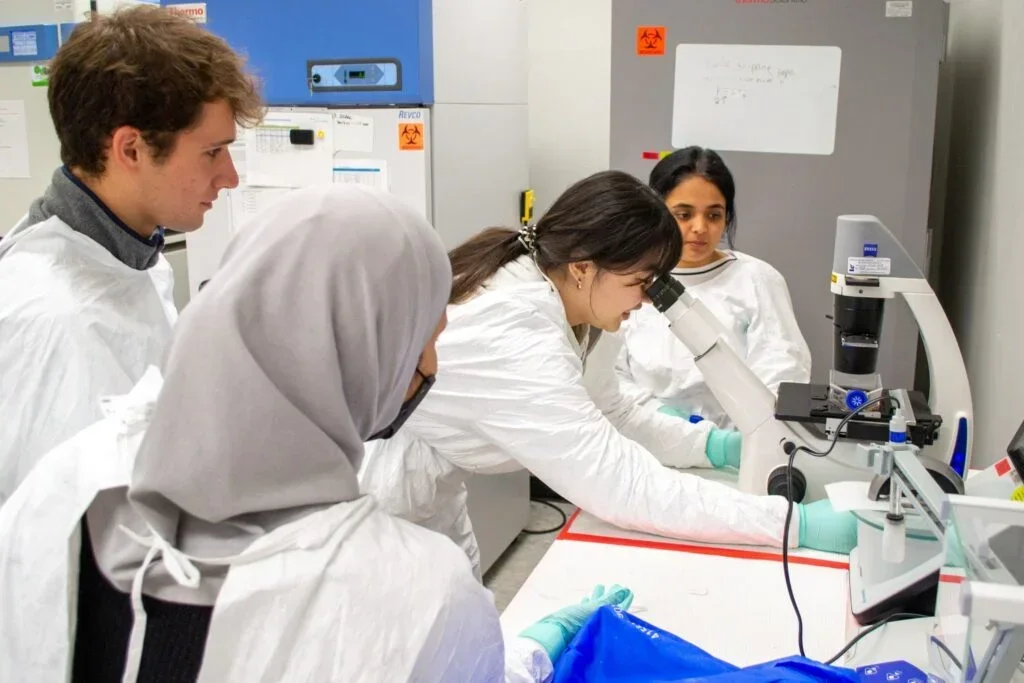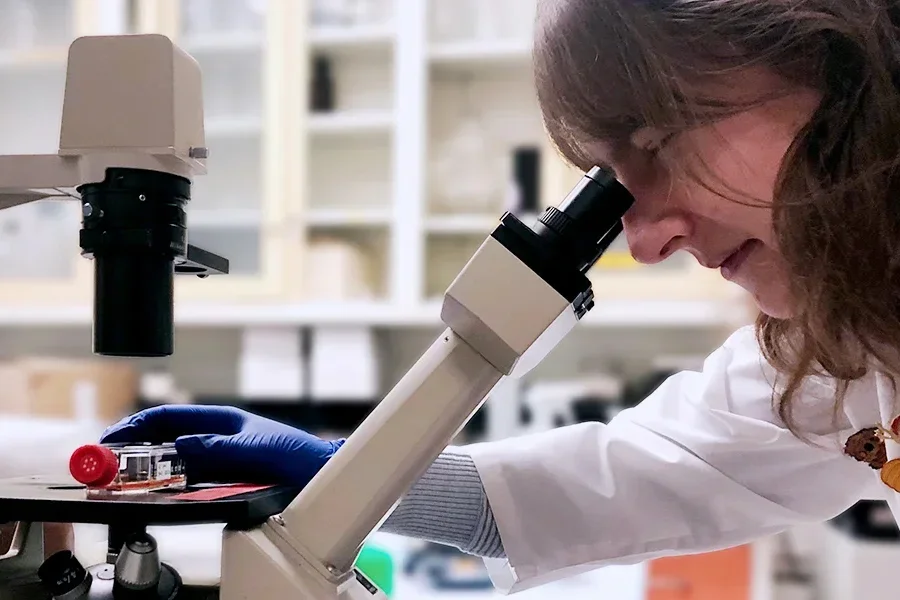The Master of Science in Biochemistry & Molecular Biology at Georgetown University is a basic science program that infuses core concepts of biochemistry and molecular biology as applied to biomedical sciences and biotechnology, providing students with a rigorous and challenging curriculum.
Learn MoreWorld-class training in cutting-edge science
Join our expert faculty in the nation’s capital for the next step in your education. Our programs give you in-depth knowledge, hands-on experience, and the connections to put it all to use.
Biomedical Graduate Education offers five interdisciplinary and translational science master’s programs.
Programs at a Glance
| Degree | Focus | Related Careers |
|---|---|---|
| M.S. in Biochemistry & Molecular Biology | Master core concepts of biochemistry and molecular biology as applied to the biomedical sciences and biotechnology. | •Government agencies •Academic institutions •Research laboratories •Biotechnology companies •Advanced degrees: Ph.D., M.D., D.O., DDS, J.D., MBA |
| M.S. in Integrative Neuroscience | Gain an integrated understanding of neuroscience, statistics, experimental design, and technical approaches. | •Research industry •Government agencies •Education •Laboratories •Advanced degrees: Ph.D., M.D., D.O. |
| M.S. in Microbiology & Immunology | Build experience in microbiology, immunology, and modern molecular genetics. Gain insights into infectious disease response. | •Industry •Research •Education •Disease prevention •Advanced degrees, Ph.D., M.D., D.O. |
| M.S. in Pharmacology | Study pharmacology, biochemistry, and physiology. | •Advanced degrees: M.D., D.O., Ph.D., Pharm.D. •Public sector: NIH, FDA, etc. •Private sector: Pharma, biotech, etc. |
| M.S. in Tumor Biology | Develop a comprehensive understanding of the mechanisms of cancer progression and the clinical challenges of treatment. | •Advanced degrees: Ph.D., M.D., D.O. •Healthcare research •Academic research •Public or private sector research |
M.S. in Biochemistry & Molecular Biology
Core Topics
- Biochemistry
- Methods
- Cell culture
- Bioinformatics
- Lab applications
- Lab safety
- Research ethics
- Internship in biochemistry/molecular and cellular biology

M.S. in Integrative Neuroscience
The Master of Science in Integrative Neuroscience is a rigorous program offered by the Department of Neuroscience. The curriculum includes an extensive integrated overview of neuroscience, statistics, experimental design, and technical approaches.
Learn MoreCore Topics
- Basic neuroscience
- Translational neuroscience
- Imaging in neuroscience
- Molecular mechanisms of neurodegeneration
- Experimental approaches and techniques
- Mentored research practicum

M.S. in Microbiology & Immunology
The Master of Science in Microbiology & Immunology is a flexible program that allows students to gain or enhance their background in microbiology, immunology, and various aspects of modern molecular genetics. Proximity to the National Institutes of Health and other organizations provides a unique learning environment with rarely available insights into the national response to the emerging problems of infectious diseases.
Learn MoreCore Topics
- Biochemistry and cellular sciences
- Core methods of biochemistry
- Immunology
- Bacteriology and mycology
- Biology and biochemistry of viruses
- Microbial pathogenesis

M.S. in Pharmacology
The Master of Science in Pharmacology is a one-year, non-thesis degree program that offers rigorous coursework in pharmacology, biochemistry and physiology, as well as the option to conduct research or choose elective courses from across our biomedical departments. Our typical cohort of 15-20 students benefits from a small class size in our main pharmacology courses and receives personalized attention from our faculty, whether in the classroom or the laboratory.
Learn MoreCore Topics
- Principles of pharmacology
- Fundamentals of physiology
- Cell and molecular physiology
- Pharmacology research

M.S. in Tumor Biology
Master of Science in Tumor Biology students learn basic concepts in cancer biology, including in biochemistry, pharmacology, prevention and methodology specific to cancer research. Students will be trained in basic laboratory techniques and will complete a research project at Lombardi Comprehensive Cancer Center.
Learn MoreCore Topics
- Cellular and molecular aspects of the transformed cell
- Biochemistry for cancer research
- Cancer research techniques

Apply Now
Ready to start your application? Create an applicant account in our online portal.






